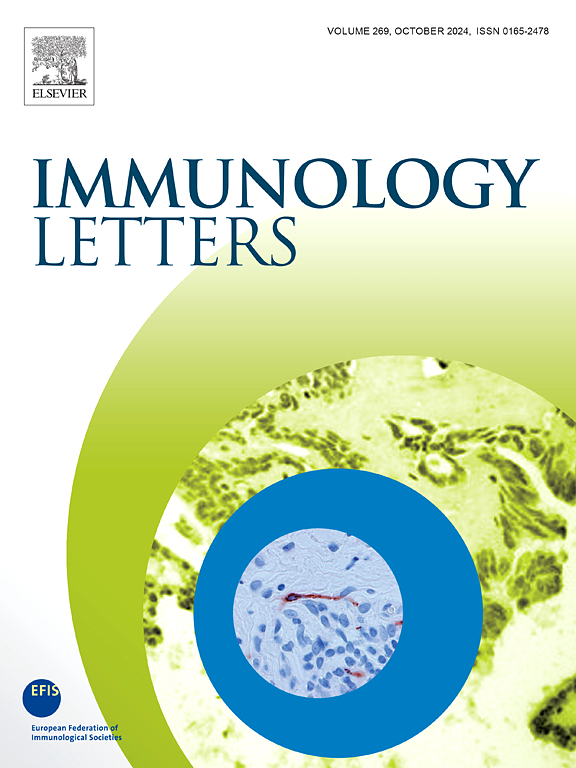The importance of type I interferon in orchestrating the cytotoxic T-cell response to cancer
IF 3.3
4区 医学
Q3 IMMUNOLOGY
引用次数: 0
Abstract
Both type I interferon (IFN-I) and CD4+ T-cell help are required to generate effective CD8+ T-cell responses to cancer. We here outline based on existing literature how IFN-I signaling and CD4+ T-cell help are connected. Both impact on the functional state of dendritic cells (DCs), particularly conventional (c)DC1. The cDC1s are critical for crosspresentation of cell-associated antigens and for delivery of CD4+ T-cell help for cytotoxic T-lymphocyte (CTL) effector and memory differentiation. In infection, production of IFN-I is prompted by pathogen-associated molecular patterns (PAMPs), while in cancer it relies on danger-associated molecular patterns (DAMPs). IFN-I production by tumor cells and pDCs in the tumor micro-environment (TME) is often limited. IFN-I signals increase the ability of migratory cDC1s and cDC2s to transport tumor antigens to tumor-draining lymph nodes (tdLNs). IFN-I also enables cDC1s to form and sustain the platform for help delivery by stimulating the production of chemokines that attract CD4+ and CD8+ T cells. IFN-I promotes delivery of help in concert with CD40 signals by additive and synergistic impact on cross-presentation and provision of critical costimulatory and cytokine signals for CTL effector and memory differentiation. The scenario of CD4+ T-cell help therefore depends on IFN-I signaling. This scenario can play out in tdLNs as well as in the TME, thereby contributing to the cancer immunity cycle. The collective observations may explain why both IFN-I and CD4+ T-cell help signatures in the TME correlate with good prognosis and response to PD-1 targeting immunotherapy in human cancer. They also may explain why a variety of tumor types in which IFN-I signaling is attenuated, remain devoid of functional CTLs.
I 型干扰素在协调细胞毒性 T 细胞对癌症的反应中的重要性
I 型干扰素(IFN-I)和 CD4+ T 细胞的帮助对产生有效的 CD8+ T 细胞抗癌反应都是必需的。我们在此根据现有文献概述 IFN-I 信号传导与 CD4+ T 细胞帮助之间的联系。两者都会影响树突状细胞(DCs)的功能状态,尤其是常规(c)DC1。cDC1s对于细胞相关抗原的交叉呈递以及CD4+ T细胞对细胞毒性T淋巴细胞(CTL)效应器和记忆分化的帮助至关重要。在感染中,病原体相关分子模式(PAMPs)促使 IFN-I 的产生,而在癌症中,IFN-I 的产生则依赖于危险相关分子模式(DAMPs)。肿瘤微环境(TME)中的肿瘤细胞和 pDC 产生的 IFN-I 通常是有限的。IFN-I 信号能增强迁移性 cDC1s 和 cDC2s 将肿瘤抗原运送到肿瘤引流淋巴结(tdLNs)的能力。IFN-I 还能刺激趋化因子的产生,吸引 CD4+ 和 CD8+ T 细胞,从而使 cDC1s 形成并维持帮助递送平台。IFN-I 通过对交叉呈递和为 CTL 效应体和记忆分化提供关键性成本刺激和细胞因子信号产生相加和协同影响,从而与 CD40 信号共同促进帮助的传递。因此,CD4+ T 细胞的帮助取决于 IFN-I 信号。这种情况既可在tdLNs中发生,也可在TME中发生,从而促进癌症免疫循环。这些观察结果可以解释为什么在 TME 中 IFN-I 和 CD4+ T 细胞帮助特征与人类癌症的良好预后和对 PD-1 靶向免疫疗法的反应相关。它们还可以解释为什么 IFN-I 信号被削弱的各种肿瘤类型仍然缺乏功能性 CTL。
本文章由计算机程序翻译,如有差异,请以英文原文为准。
求助全文
约1分钟内获得全文
求助全文
来源期刊

Immunology letters
医学-免疫学
CiteScore
7.60
自引率
0.00%
发文量
86
审稿时长
44 days
期刊介绍:
Immunology Letters provides a vehicle for the speedy publication of experimental papers, (mini)Reviews and Letters to the Editor addressing all aspects of molecular and cellular immunology. The essential criteria for publication will be clarity, experimental soundness and novelty. Results contradictory to current accepted thinking or ideas divergent from actual dogmas will be considered for publication provided that they are based on solid experimental findings.
Preference will be given to papers of immediate importance to other investigators, either by their experimental data, new ideas or new methodology. Scientific correspondence to the Editor-in-Chief related to the published papers may also be accepted provided that they are short and scientifically relevant to the papers mentioned, in order to provide a continuing forum for discussion.
 求助内容:
求助内容: 应助结果提醒方式:
应助结果提醒方式:


